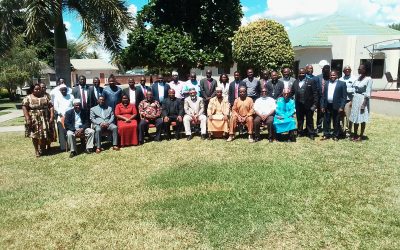By PAC Correspondent
In March 2023, civil society groups from Southern Africa converged on Lusaka, Zambia for debate on possibility of a free movement protocol for people in Africa.
The Social and Cultural Council (ECOSOCC) has been on sensitizing decision-makers and civil society organizations (CSOs) on the role they can play in advocating for the ratification, domestication and implementation of the African Union FMP across Africa in an an effort to increase dialogue around the protocol widely referred to as the AU FMP.
So this year, ECOSOCC in partnership with Deutsche Gesellschaft fuer Internationale
Zusammenarbeit (GIZ) GmbH, will be holding a “National Dialogue Series,” which are multi-stakeholder round-table discussions on the AU FMP with key policymakers.
The stakeholders cut across government ministries, agencies, CSOs, representatives of the AU Commission, ECOSOCC General Assembly Members concerned Member States and Members of the Pan-African Parliament, among others.
In his key note statement, Mr. Robert Phiri, Deputy Presiding Officer (South), ECOSOCC stressed on the need for CSOs to work towards realization of defined road maps on the free movement of persons.
“Democracy provides space for contention of ideas and opinions. As such migration governance and free movement of persons must find their own space in the democratic consolidation as we roll out these events…
“Democracy is a journey and within this journey different demands by societies are being advanced. Societies are changing, slowly people are gaining understanding of their basic rights,” Said Phiri who is also Executive Director of Public Affairs Committee (PAC) in Malawi.
The conference observed that popularization, ratification of the protocol and its domestication will require structured advocacy and lobbying hence the need for CSOs to work together and build a strong ECOSOCC for the realization of free movement of persons in Africa.
Delegates acknowledged that the journey for the advocacy on free movement of persons requires concerted stakeholder efforts.
“…the journey we have taken will face some hurdles as we inch towards the final goals. Indeed, it will not be an easy path for different member states will move at their own pace because of their different priorities at domestic level.
“(But) the eco-system of democracy is changing every day. It is no secret therefore that the system of democracy will be fraught with challenges. But there will always be opportunities to develop a common understanding as well,” said Phiri.
The national dialogue series are part of the opportunities that must be utilized to achieve articulated goals and practical aspects of free movement of persons across boarders as was experienced when cyclones hit Malawi and Mozambique.
During disasters, no formalities for crossing boarders were followed somewhat teaching mankind that “free movement of persons is a reality and not just a concept”.
ECOSOCC has a structure that funnels down from continental, regional to national level beyond which ECOSCC has created windows for civil society participation even if organizations are not accredited to it.
